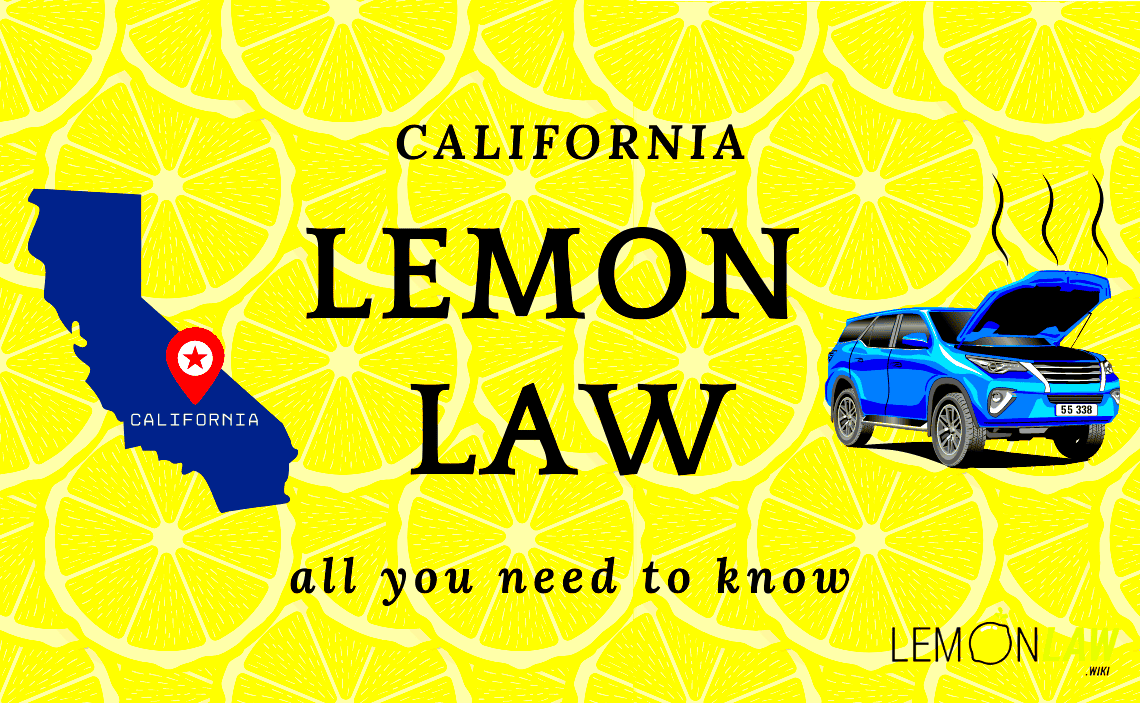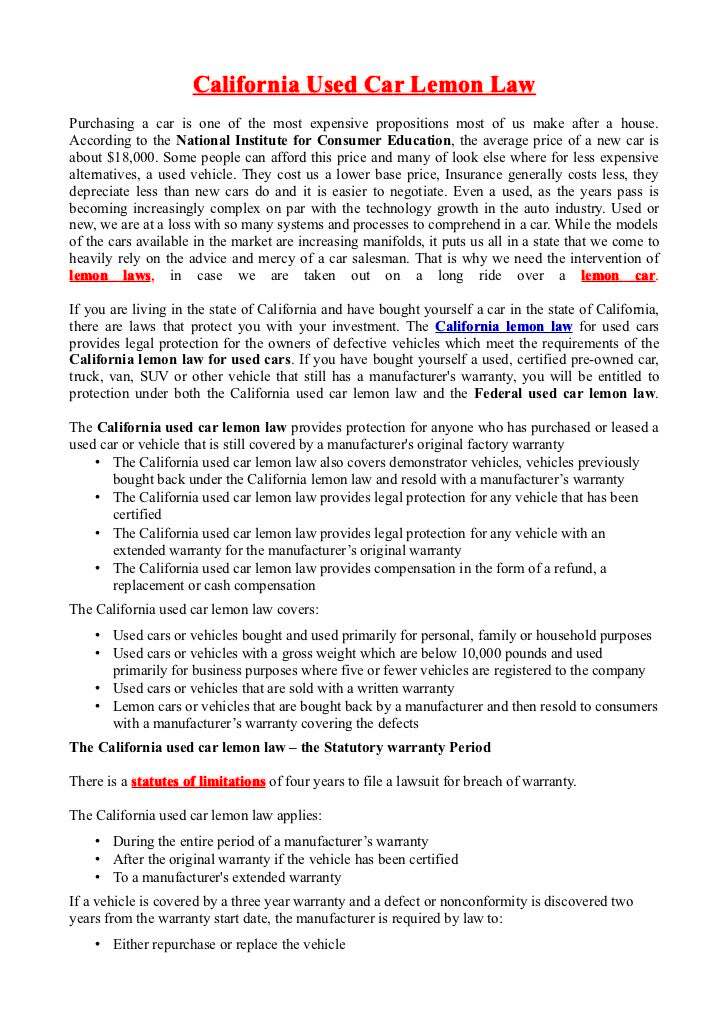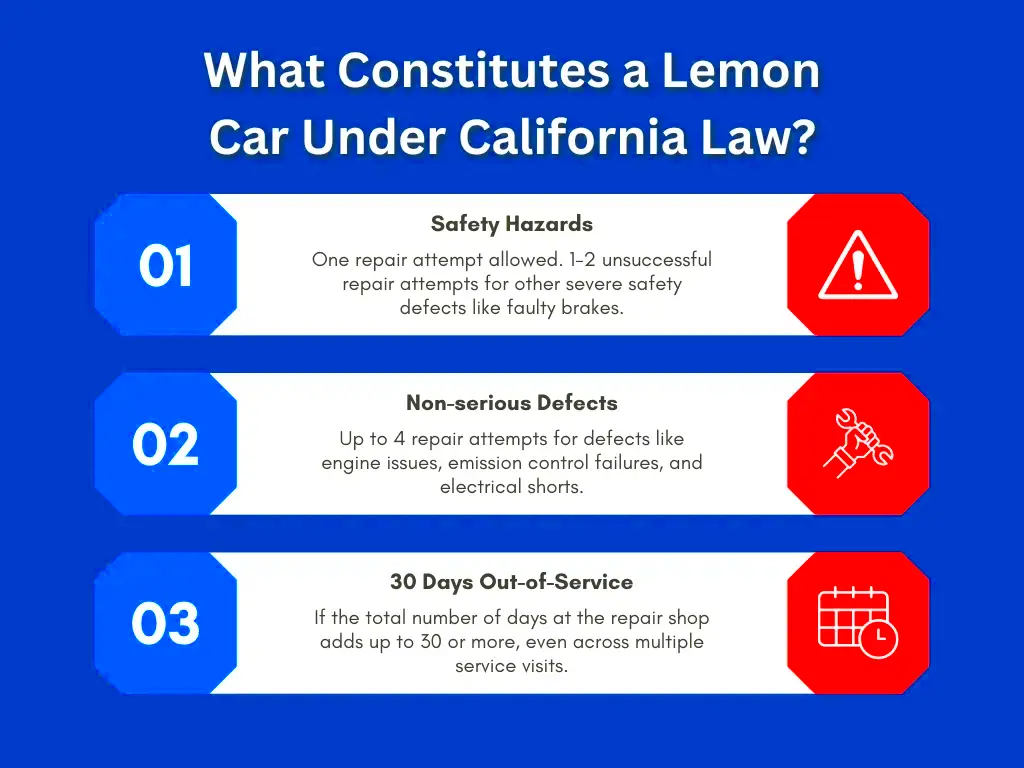Understanding Lemon Law for Used Cars in California
Lemon Laws are crafted in a way that they defend buyers from buying malfunctioning cars. A remedy under Lemon Law can be availed where there is a considerable defect that affects the use, value or safety of the car and it has not been fixed by the dealer or producer. The law provides that motorcycle and automobile buyers have choices when such vehicles become “lemons” meaning cars that do not conform to quality and performance requirements on multiple occasions.Lemon Law safety nets reach out and embrace even second-hand vehicles in the state of California; however, there are certain specifications. In contrast to new automobiles, pre-owned ones must fulfill more requisites so as to be eligible. These requirements consist of:These situations are meant to make it easier for those who have bought second-hand cars and if such cars are found defective. But normally, it is a more complicated affair as compared with new models.If you want to be covered by California Lemon Law, there are some conditions that the used car must comply with. These are the main points to note:Knowing these qualifications of eligibility can aid you in identifying whether your second-hand vehicle falls within the Lemon Law jurisdiction and the necessary actions to follow when making a claim.
How Lemon Law Applies to Used Cars

- Warranty Coverage: The used car must be covered by a warranty, whether it’s from the dealer or a third party.
- Defects Must Be Substantial: The defects must significantly affect the car’s use, value, or safety.
- Repair Attempts: The vehicle must have been repaired multiple times for the same issue or be out of service for an extended period.
- Timeframe: The problems should be reported within the warranty period or a reasonable time after purchase.
Eligibility Requirements for Lemon Law

- Warranty: The car must have a warranty in effect at the time the defect is discovered. This can be an express warranty from the dealer or a service contract.
- Substantial Defects: The defect must be significant enough to affect the car’s usability, value, or safety. Minor issues typically do not qualify.
- Repair Attempts: You must provide evidence that the car has been taken in for repairs multiple times for the same issue. Generally, the law requires at least two to three unsuccessful repair attempts.
- Time and Mileage: The defect must occur within a specific period or mileage limit, as outlined in the warranty or lemon law guidelines.
To do something about this, follow these steps if you suspect your used car is a lemon:In order for you to be ready in a situation where it would become necessary and urgent to go for legal solutions according to lemon laws, undertake the following procedures.Some important steps need to be taken to file a claim under the Lemon Law:There are ways to simplify the Lemon Law process and improve their possibility of winning.The litigation brought pursuant to Lemon Law manifests intricacies that render them difficult and may involve numerous obstacles.These challenges can be useful to know so that one is prepared and can work with their lawyer to surmount obstacles encountered in Lemon Law cases.
Steps to Take If You Think Your Used Car Is a Lemon

- Document the Issues: Keep detailed records of all problems with the car, including dates, descriptions of issues, and repair attempts. This documentation will be crucial for your claim.
- Contact the Dealer or Seller: Notify the dealer or seller of the problems and request repairs. Provide written notice and keep copies for your records.
- Allow Repair Attempts: Give the dealer or manufacturer a reasonable number of attempts to fix the defects. California Lemon Law typically requires at least two or three unsuccessful repair attempts.
- Get a Written Record: Obtain written confirmation of all repair attempts and any related communications. This will support your case if legal action becomes necessary.
- Seek Professional Advice: Consult with a Lemon Law attorney to evaluate your case and understand your options. They can help you navigate the legal process and improve your chances of a successful claim.
What to Do When Filing a Lemon Law Claim
- Gather Documentation: Collect all relevant documents, including repair records, warranty information, and correspondence with the dealer or manufacturer.
- Write a Formal Complaint: Draft a formal complaint detailing the defects, repair attempts, and your request for resolution. This document should be sent to the dealer, manufacturer, or their legal representatives.
- Submit a Claim to the Manufacturer: File a claim directly with the manufacturer or their designated arbitration service. Many manufacturers offer arbitration as an alternative to court.
- Consider Legal Action: If arbitration does not resolve the issue, or if it is not an option, consult with your attorney about filing a lawsuit in a civil court.
- Attend Hearings: Be prepared to attend hearings or arbitration sessions. Present your evidence clearly and follow legal advice to support your case.
Common Challenges in Lemon Law Cases
- Burden of Proof: Demonstrating that the car is a lemon can be difficult. You must prove that the defects are substantial and that the dealer or manufacturer had multiple opportunities to fix the issues.
- Warranty Disputes: Disagreements may arise over whether the warranty covers the defects. Ensuring that you have clear documentation of the warranty terms is essential.
- Repair Records: Incomplete or inaccurate repair records can weaken your case. Keeping thorough and accurate records is crucial for proving your claims.
- Manufacturer Resistance: Manufacturers may dispute the validity of your claim or offer a settlement that is less than what you deserve. Negotiating or pursuing legal action may be necessary.
- Legal Costs: Legal fees and other costs associated with filing a Lemon Law claim can be significant. It’s important to weigh these costs against the potential benefits of pursuing the claim.
In case your secondhand car qualifies for the Lemon Law, you could be eligible for multiple remedies. These solutions aim at rectifying the problems associated with your car and providing compensation for any inconveniences suffered. The primary legal remedies comprise:Every solution seeks to fix the problem and guarantee that you receive what is justly yours. Reach out to a Lemon Law lawyer for advice on what option would be most appropriate for your case.Choosing the appropriate legal aid is important in determining the success of your case related to Lemon Law. This article will provide guidance on how to get professional legal help.In accordance with these processes, it is possible for you to locate an experienced lawyer who would take you through the Lemon Law proceedings so that you can get a good result.Lemon Law: FAQs and Their ResponsesShould you wish to know more or get help regarding your claim under the lemon law, it can be prudent to contact a lawyer who is knowledgeable in such matters for more advice and support.
Legal Remedies Under Lemon Law
- Refund: You may be entitled to a full refund of the purchase price, including any down payments and trade-in value. This refund also typically includes sales tax, registration fees, and other related costs.
- Replacement: In some cases, you can receive a replacement vehicle of similar value and features. This is an option if a refund is not feasible or preferred.
- Repair Costs: You may be reimbursed for any repair costs incurred during the warranty period, if the dealer or manufacturer failed to address the defects adequately.
- Legal Fees: If you win your case, the court may order the dealer or manufacturer to pay your legal fees and other costs associated with the claim.
Finding Legal Help for Lemon Law Issues
- Research Attorneys: Look for attorneys who specialize in Lemon Law cases. Check their experience, client reviews, and success rates.
- Consult Multiple Lawyers: Schedule consultations with several attorneys to discuss your case. This will help you gauge their expertise and approach.
- Ask About Fees: Inquire about the lawyer’s fee structure. Many Lemon Law attorneys work on a contingency fee basis, meaning they only get paid if you win your case.
- Check Credentials: Verify the lawyer’s credentials and membership in professional associations related to Lemon Law or consumer protection.
- Evaluate Communication: Choose an attorney who communicates clearly and keeps you informed about the progress of your case.
Frequently Asked Questions
- What is Lemon Law? Lemon Law is a legal protection that provides remedies for buyers of defective vehicles that fail to meet quality and performance standards.
- Does Lemon Law apply to used cars? Yes, Lemon Law applies to used cars, but the vehicle must be covered by a warranty and meet other specific conditions.
- How long do I have to file a Lemon Law claim? The timeframe varies, but generally, you should file a claim within the warranty period or a reasonable time after discovering the defect.
- What if the dealer won’t fix the car? If the dealer fails to fix the car after multiple repair attempts, you may have grounds for a Lemon Law claim. Document all repair attempts and consult with an attorney.
- Can I get a refund for a Lemon Law claim? Yes, a refund is a possible remedy under Lemon Law, which includes the purchase price, taxes, and fees.
Conclusion
For a comprehensive understanding of the lemon law regarding used cars in California, one has to bear in mind that it’s not a simple matter. In case of a vehicle defect, there are different approaches for every individual. It is advisable for one to seek assistance from an experienced lawyer who specializes in lemon cases because he/she can make a significant difference in how your case is handled. Therefore, all problems related to it should be taken into account in detail so that your claim can depend on them as evidence. The way you handle this situation will determine whether or not your rights under the Lemon Law are respected and whether or not you will eventually get justice.


